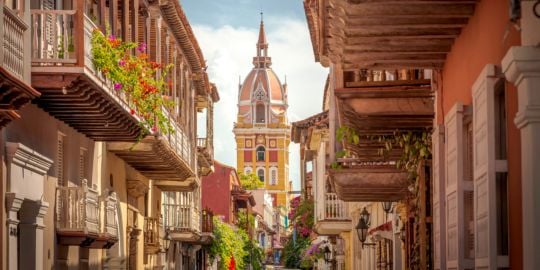Hello everyone,
What are the requirements for acquiring citizenship in Colombia? For example, length of residence, language requirements, employment etc..
What formalities are involved in the process?
What is the policy on dual-citizenship in Colombia? Do you have to give up your former nationality?
What are the advantages and benefits of acquiring Colombian citizenship, in your opinion?
Thank you for sharing your experience.
Bhavna
Naturalisation and citizenship in Colombia
Hi Bhavna! I'd really like to know more about jus soli rights here in Colombia, if anybody out there has information. My child was born here, but neither of her parents are Colombian. I'm being toldt hat she does not have access to nationality.
This article in English may help:
https://en.wikipedia.org/wiki/Colombian_nationality_law
But for the final word you need to contact the Cancillería:
http://www.cancilleria.gov.co/tramites_ … cionalidad
According to what they say, your child born of foreign parents has Colombian citizenship if in the moment of birth one of the parents was domiciled in Colombia (bold text, below). But apparently by "domiciled" they mean not just living there but a legal, authorized resident:
Nacionalidad colombiana por nacimiento
Se consideran nacionales colombianos por nacimiento, según el artículo 96 de la Constitución Política de Colombia:
a) Los naturales de Colombia, que con una de dos condiciones: que el padre o la madre hayan sido naturales o nacionales colombianos o que, siendo hijos de extranjeros, alguno de sus padres estuviere domiciliado en la República en el momento del nacimiento y;
b) Los hijos de padre o madre colombianos que hubieren nacido en tierra extranjera y luego se domiciliaren en territorio colombiano o registraren en una oficina consular de la República.
You should contact the Cancillería to discuss your case. Their phone number is at the top of the page at the link above and further down the page on the left are buttons for send message, chat and video chat.
The wikipedia article cited by OsageArcher very accurately describes the requirements to acquire Colombian citizenship. What it doesn't cover is the various documents required. You will need a certified copy of your birth certificate, with apostille from your home country ministry of foreign affairs (i.e., US State Department). When I applied, the US Embassy did not provide this service. You have to send the document along with form DS-4194 to the State Department. See this link for details https://travel.state.gov/content/travel … ices.html. If the document and its attached apostille are not in Spanish, you must have them translated by an authorized agent and there are many here in Colombia.
Basically, you apply for citizenship with the Ministry of Foreign Affairs, by delivering, in person, the application and required attached documents to the ministry in Bogota. When I applied, about three years ago, you could not use a service to deliver the documents, it had to be done in person. Since I live near Medellin, I had a friend in Bogota deliver them for me. Then, you wait.
When I applied, I was told the process would take about six months, however, it ended up being two years. I was told this was because the ministry was so bogged down with the peace process and negotiations with the FARC. The first indication that something was actually happening was a visit from representatives of the ministry. Basically, they want to make sure you are a real person and can speak Spanish. They asked several questions to make sure I had some basic knowledge of the form of government, who the President and Governor of Antioquia are. Since I was already over 65 year old, it was an irrelevant visit and test. That happened about six months into the process.
Finally, I received an email from an attorney associated with the ministry, providing me with an attached official document, stating that I had been accepted for nacionalidad colombiana and informing that the necessary documents will be sent to the office of the governor in Medellin and they would contact me.
About three months later, I was contacted by the office of the governor in Medellin and given a date and time, that I must present myself to the governor's office to be sworn in as a citizen. Although it was a private ceremony, since I was the only one being sworn in, it was quite formal and impressive. All that's left to do is get your cedula. There will be officials present in the swearing ceremony, who can give you directions to the right office.
Interestingly, my cedula extrajeria expired almost a year before I received the letter confirming I had been accepted. I called ministry about a week before it expired to get guidance and was told not to worry about it and just wait. Basically, if you've got a cedula extranjeria, which gives you the right to live in Colombia, you very likely will be approved for nacionalidad colombiana.
For me the main benefit is, I no longer have to worry about getting my residence visa and cedula renewed, periodically. However, I should note, as a naturalized citizen, you have all the rights and responsibilities of a natural born citizen. I am now a Colombian.
I should also note, "technically", if you are a US Citizen and acquire a second citizenship in another country AND TAKE A SWORN OATH to that second country, you "may", if you wish, notify the US State Department of that fact (with evidence) and state you are renouncing your US Citizenship. I'm told, by someone who did this, the State Dept., acknowledged the fact, even though he didn't follow "official procedures" to renounce. So, that's hearsay and not personal experience.
Laceja, the last paragraph is incorrect. You are allowed to have dual citizenship, which I have and there is no problem. Millions upon millions of people in the US have it, whether from Mexico or Canada or Colombia or Brasil or anywhere, you do not have to renounce anything:)
If you send a letter to the State Department, with proof you've pledged allegiance to another country, Colombia for example, and declare in the same letter you are renouncing your citizenship, they will accept that, without filing any "official" forms. However, if you don't make an issue of it, they will ignore the fact you have a second citizenship.









